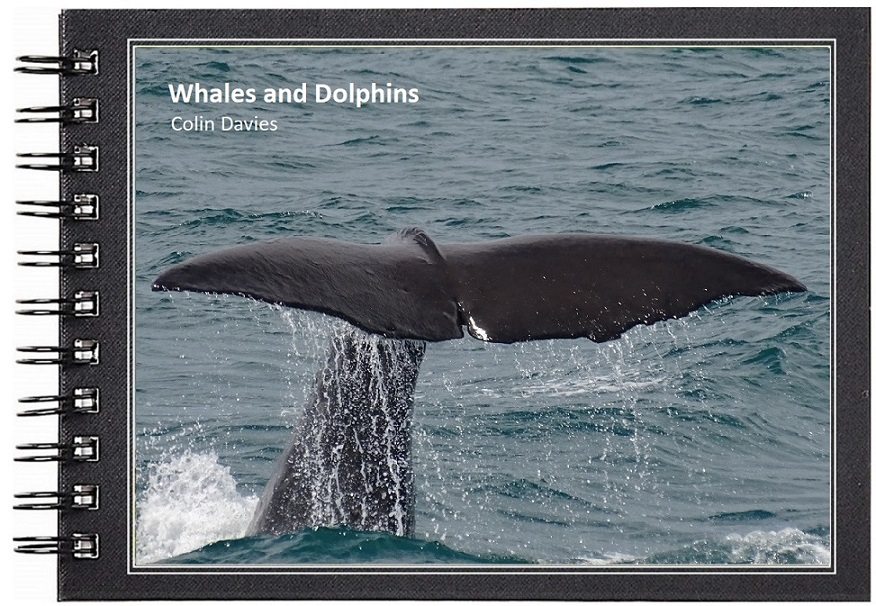My only new species of bird from this holiday turned up towards the end of what had so
far proven to be a slightly disappointing whale watching trip out of Calheta.
To be fair, we had started off with fabulous views of a pod of about 30
bottlenose dolphins, probably showing better than I'd ever experienced
previously with the species, but we had seen none of the hoped for whales.
We had reached the furthest point from land, about 4 miles out from Jardim do
Mar and stopped the boat for a final look at a more distant pod of dolphins
when I noticed a shearwater on the opposite side of the boat, unfortunately
about to fly into the glaring sunlight. This was exciting because by mid
December virtually all seabirds have left this area and I didn't expect to see
anything avian at sea. However, there was perhaps one possibility....
The bird had an odd fluttering flight low over the water, followed by more
typical shearwater glides, but then it was frustratingly lost in the glare.
Fortunately a few moments later it flew back out of the sunlight briefly and
allowed me a better look. It was clearly a small bird of the Manx shearwater
variety, and not one of the larger shearwaters such as Cory's which also breed
around these islands.
My excitement levels went up a notch, because before we travelled to Madeira,
I'd done quite a bit of research into which species of seabird, if any, I had
a chance of seeing in December. There was really only one, Barolo shearwater,
and if I was lucky enough to see one, I didn't want to tick it based on just
an assumption, I wanted to know exactly why it was a Barolo. So for weeks I'd
studied the finer details of identifying this particular species because it
was the only lifer I was likely to get on the holiday and if I did
see one, I wanted to be able to eliminate the doubt of an extremely out of
season Manxie.
 |
| Barolo shearwater © madeirabirds.com. Click here to open their website in a new window. |
The bird I was watching certainly seemed smaller than Manx with a startlingly
white, unmarked underwing, right up to the wing tip, with just a
narrow black border. It was obviously lacking the dark underwing primaries which are typical of Manx. The upperparts were generally blackish like Manx but I
can't say that I saw any silvery patches on the upperwing, though the light
probably wasn't conducive to seeing such detail. However I did get a brief
glimpse of a pale face which along with the flight gave the bird a most
un-Manx like appearance. I was now happy that I had a Barolo shearwater!
I told the crew, but they wouldn't even believe that I'd seen a shearwater let
alone a Barolo, and in any case seemingly had no intention of trying to get a
better look at a bird which most other passengers had no interest in seeing at the
expense of yet another view of a bottlenose dolphin. So I have what I have, a
good memory of a Barolo shearwater but no photographs, you'll just have to be
happy with dolphin photos, or the photo above of a different bird from Madeira birds.com.
Barolo shearwater is endemic to Madeira, the Canary islands and the Azores. It
spends all year relatively close to it's breeding grounds, whereas Manx is
absent from these waters between the end of October to the middle of January.
In this respect, being here in mid-December actually helped me, because I had
just one bird of one species to concentrate on, with none of the shearwater and petrel "soup" of summer, and the only real difficulty was ruling out Manx shearwater. Thank goodness I did my research.
Barolo shearwater has been known by several different names in the past, when I started out it was simply little shearwater, but it's also gone by the name of North Atlantic little shearwater and following further splits Macronesian shearwater, and probably others as well. No doubt one day it will be called Madeiran shearwater when they spilt it from the Canarian and Azores birds! Until that day arrives, Barolo it is.
It's a species that I missed last time we were in Madeira and it was high on
my most wanted list, almost a mythical bird, apparently one of the most difficult of Madeiran seabirds to see on a pelagic. Despite my comments higher up
this post, I didn't really expect to see one on this holiday with no pelagic
trips running during the winter and having to rely on whale watching trips in
order to get out to sea.
Thanks to Madeirabirds.com for their help and comments not only with this sighting but also throughout the holiday. Their pelagic trips run during the summer and are thoroughly recommended if you're planning on visiting Madeira.
Adult and calf bottlenose dolphin.
Forty-seven grey herons flew west at Calheta, including a single flock of 36
birds.
A few days ago I found a spotted sandpiper at Calhetta and it was still present today.
















No comments:
Post a Comment